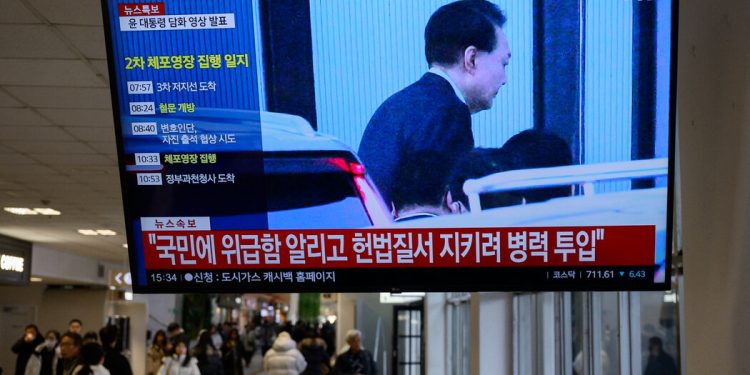As president of South Korea, Yoon Suk Yeol lived in a luxurious hilltop mansion, threw parties, and had a small army of personal guards. These days, he is alone in a 107-square-foot prison cell, eating simple food like noodles and kimchi soup and sleeping on the floor.
This will be his new reality for some time to come, after he was formally arrested on Sunday morning on insurrection charges as part of an investigation into his ill-fated declaration of martial law last month.
Mr. Yoon, 64, has been detained at the Seoul Detention Center, a government prison south of Seoul, since Wednesday, when he became the first sitting president in South Korean history to be arrested as part of a criminal investigation. When a Seoul district court issued a warrant for his arrest, he went from being a temporary detainee to a criminal suspect facing indictment and trial.
This change in status meant that Mr. Yoon was unlikely to leave prison anytime soon. Within the next 18 days, criminal investigators and prosecutors are expected to charge him with leading an insurrection during last month’s short-lived martial law. If convicted, he faces life imprisonment or the death penalty.
Mr. Yoon’s new situation was symbolic of his dramatic fall from grace: from blustering head of state to impeached president to inmate accused of committing one of the worst offenses in South Korea’s penal code . He is the first South Korean to face insurrection charges since former military dictator Chun Doo-hwan was convicted in the 1990s.
As president, Mr. Yoon loved throwing parties, often inviting like-minded politicians for evening drinks and even cooking and serving egg rolls and barbecue to his presidential press corps. He showed off his entertaining skills abroad when he sang “American Pie” at a White House dinner in 2023.
Now Mr. Yoon will wake up not to presidential aides and chefs catering to his needs, but to a simple prison breakfast, usually consisting of dumpling soup, bread or cereal. A meal in prison costs on average $1.20.
The dramatic political upheaval he unleashed appears to have stunned him as much as ordinary South Koreans.
“Ironically, it was after my impeachment that I truly realized that I was indeed the president,” Mr. Yoon said in a lengthy statement on Wednesday.
Many South Korean politicians and dignitaries – including two former presidents and Lee Jae-yong, head of the Samsung conglomerate – have been detained at the Seoul detention center in Uiwang, a city south of Seoul. When he was a prosecutor, Mr. Yoon helped imprison one of the two former presidents, Park Geun-hye, for corruption. The prison also houses some of the country’s most infamous death row inmates, including serial killers.
Government officials said Mr. Yoon would not receive any special treatment except that he would be kept in his own room, away from other inmates. After his official arrest, he had to undergo a simple medical examination. and receive a toothbrush and other essentials for prison life. He would be assigned an inmate number and a pea green prison uniform.
His cell will be equipped with a television, a sink, a small cupboard, a reading desk which also serves as a dining table and a foldable mattress for sleeping. The cell has a toilet but no shower. The space will be monitored 24 hours a day using closed circuit television.
Mr. Yoon is a staunch follower of right-wing YouTubers who have supported his government and spread conspiracy theories portraying his domestic enemies as dangerous sympathizers of North Korea and China. Since declaring martial law on Dec. 3, Mr. Yoon has said his action was inspired in part by the same fear, outrage and suspicion spread by extremists on YouTube.
The prison television only broadcasts programs authorized by the Ministry of Justice. Inmates do not have access to the Internet, including YouTube. At rallies calling for Mr. Yoon’s arrest in recent weeks, some demonstrators held signs that read: “Yoon Suk Yeol: It’s time to digitally detox!”
Yang Kyeung-soo, a union leader who had spent time in a solitary confinement cell at the Seoul Detention Center, posted prison survival tips on that you do your own dishes. If you eat everything they serve, you will gain weight quickly.
Mr. Yoon was required to meet frequently with his lawyers in a visiting area to prepare for his trial. Separately, the country’s Constitutional Court is deliberating whether the National Assembly’s Dec. 14 vote to impeach him was legitimate and whether he should be formally removed from office.
Mr. Yoon’s martial law lasted only six hours because the opposition-dominated National Assembly rejected it. But during that brief period, he ordered military commanders to seize the assembly and arrest his political enemies, according to prosecutors who arrested and charged the military generals accused of helping Mr. Yoon carry out a insurrection.
Mr. Yoon and his lawyers insisted that the imposition of martial law was a legitimate use of presidential power.
After arresting Mr. Yoon on Wednesday, officials from the Corruption Investigation Bureau for the country’s top officials questioned him until he was sent to rest in a cell at the Seoul detention center. But he has since refused to leave his cell to answer further questioning.
“He made his basic positions known from the first day of interrogation, and he no longer feels any reason or need to submit to question-and-answer type interrogation,” said one of his lawyers, Seok Dong- hyeon.
When Ms. Park, the former president, was being held in the detention center, die-hard supporters gathered near the walls every morning and shouted “Hello, President Park Geun-hye!” »
Since Mr. Yoon’s arrival, some supporters have camped outside, calling his indictment and arrest “null and void.”


